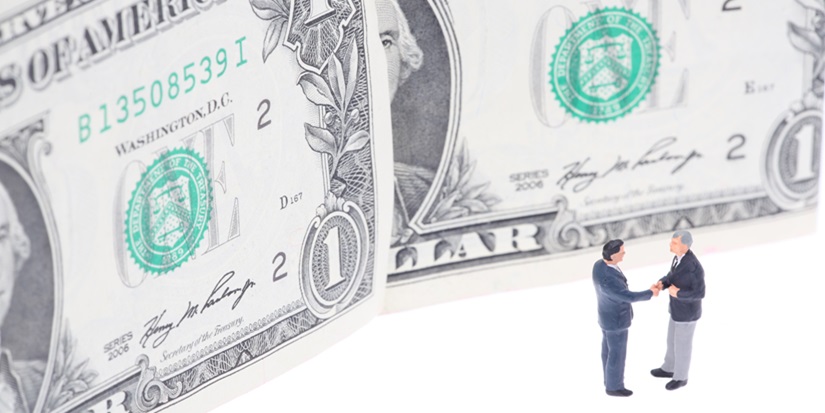I’m sorry to shock anyone, but sometimes wealthy businesspeople try to buy political favors. And sometimes politicians cooperate.
Bribery, while common in some countries, is economically inefficient. That’s why corruption (or lack thereof) is one of the criteria separating “developed” economies from “emerging” ones.
Nevertheless, such things happen in the US, too. Often the big surprise isn’t the scandal… but the fact it wasn’t even going to work and instead backfires on everyone involved.
In my view, this is just a free market functioning properly. Let greed get the best of you and invest in a stupid idea? Nature will take its course, eventually.
Sometimes, it happens fast.
Rising Wages
Minimum wage laws are always controversial. Employers don’t like being told what they must pay while many workers will say the amount is too low.
In economic theory, mandated price floors distort supply and demand. The result should be a reduced supply of the underpriced goods—labor, in this case.
But that’s theory. In practice, the effects are less clear. It gets especially messy when the minimum wage favors some businesses over others.
In 2022, California’s legislature passed a law raising the minimum wage for fast-food chain workers from $16 to $20 per hour.
Within that law was a provision exempting restaurants that sell bread as a standalone product (i.e., not as part of a sandwich). It also defined “bread” to exclude bagels and croissant-like items.
Further, it was written to exempt only restaurant chains that were already selling the defined forms of bread. Others couldn’t escape the requirement simply by adding bread to their menus.
Last month, Bloomberg Newsreported Governor Gavin Newsom had demanded this exception in exchange for his support of the bill. When questioned by local media, Gov. Newsom called the provision “just part of the sausage making.”
Yet the bread thing was too oddly specific to be a legislative accident. It seemed meant to benefit someone.
It turns out one of the governor’s longtime donors is Greg Flynn, a franchise restaurant owner whose California holdings include dozens of Panera Bread locations. Mr. Flynn had been publicly critical of the fast-food bill... which (surprise!) passed with an exemption seemingly tailor-made for him.
But were the California Panera franchises economically exempt? That’s a different question.
Competing for Workers
Labor is a market. Employers in a given industry and region who don’t offer competitive wages and working conditions will attract lower-quality workers, or none at all.
Fast-food jobs involve long, stressful hours on your feet, often in hot kitchens, dealing with sometimes difficult customers. The number of workers willing to take those jobs is limited.
In this kind of labor market, the bread exemption plan made little sense. Being legally allowed to offer lower wages wouldn’t gain a restaurant owner anything. It would just make hiring more difficult.
So, if all this is what it appears to be, it was never going to work. Panera’s actual payroll savings would probably have been minimal. Recruiting costs and turnover would have gone up.
So why even bother? I don’t know. But it’s been evident many business owners think the labor shortage is temporary. They expect to resume the good old days in which they had 10 applicants for every open position and workers took whatever they were offered.
The demographic data says that’s not likely. Nor will technology help. Maybe fast-food robots are coming, but not yet.
Worse Than Ever
Following the news reports and a social media firestorm, Mr. Flynn vowed to pay his workers the same minimum wage as other restaurants… which is what was going to happen anyway.
Then Governor Newsom’s staff “re-interpreted“ the law to eliminate the previously essential bread exemption.
While all the backtracking must have produced a California-sized cloud of dust, everyone involved—the governor, the legislature, and the restaurant owners—still looks terrible and gained nothing.
Governor Newsom is a Democrat, but Republicans do such things, too. For example, Donald Trump appears to have suddenly changed his mind about forcing a sale of the Chinese-owned TikTok app when a large donor asked him to reconsider.
But the real point here isn’t the politics. It’s the fact that, several years into a historically tight labor market, businesses are still looking for easy solutions.
I don’t think they will find any.
Labor-intensive service businesses have little choice but to pay much higher wages than were normal a decade ago. This means higher prices for restaurant meals, hotels, haircuts, healthcare, and other services. It adds sticky inflation pressure the Federal Reserve can’t easily control.
This kind of inflation isn’t all bad. Better pay for millions of service workers helps consumer spending and boosts growth.
But the Fed will still keep fighting, which means interest rates will probably stay higher for longer than many investors currently think. That will have consequences.
See you at the top,





